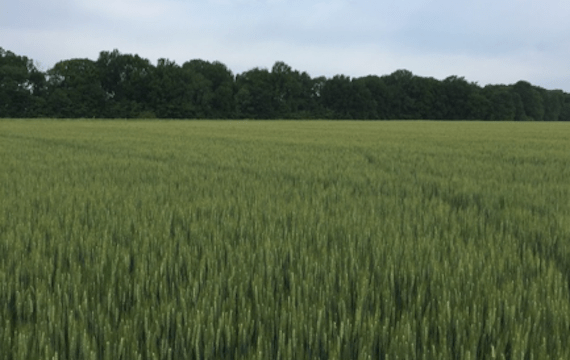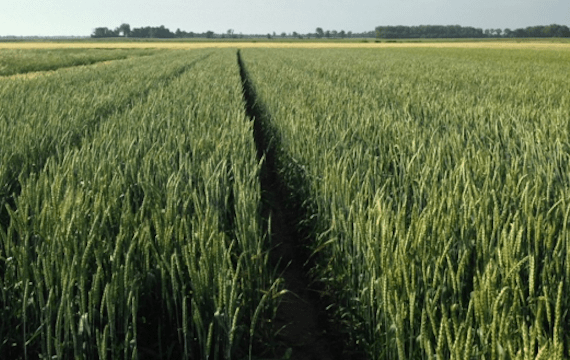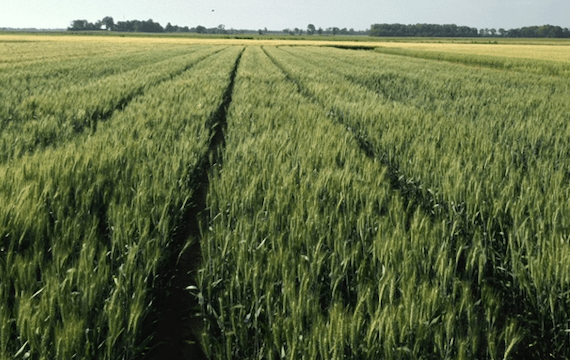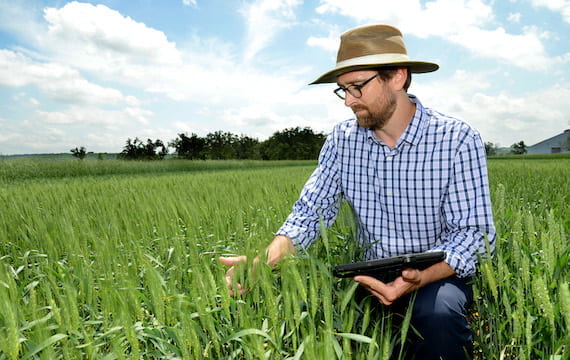Row Crops
– Wheat
Arkansas Wheat Varieties
The Wheat Breeding Program focuses on the development of varieties that are high yielding with good disease resistance and wide adaptation. In 2011, our program joined SunGrains, a cooperative research program between 6 southeastern universities which has led to two recent wheat variety releases. Yield and agronomic performance data for state and regional wheat trials can be found on the Variety Testing Programs page.
Current Varieties

ARLA06146E-1-4
Read More
Proposed for release in 2019, AR06146E-1-4 is an awned, early to mid-maturing soft red winter wheat. It has consistently high grain yield, excellent test weight and resistance to Fusarium head blight (scab), stripe rust and leaf rust.
AR06146E-1-4 had a two year (2016-2018) average yield of 72.2 bu/ac and a statewide yield of 81.8 bu/A in 2016-2017. In inoculated disease nurseries, AR06146E-1-4 has shown resistance to stripe rust and resistance to Fusarium head blight, with a DON (also known as vomitoxin) concentration of 1.7 ppm, compared to a mean of 4.1 ppm.

AR0140-4-1
Read More
Released in 2018, AR01040-4-1 is a tall, awnless, photoperiod sensitive, mid-maturing soft red winter wheat with a low vernalization requirement. It has excellent early season biomass and vigor. AR01040-4-1 was released as a wildlife food plot variety and is available through Stratton Seed (Stuttgart, AR)
AR01040-4-1 is resistant to leaf rust, all known races of stem rust (including the UG99 race structure) and moderate for Fusarium head blight (scab) and stripe rust. It is susceptible to soil borne mosaic virus. It has good yield potential in Arkansas and good adaptation to the mid-south and the southern US. From 2012-2014 it had a statewide average grain yield of 82 bu/A.

AR11LE24
Read More
Released in 2016, AR11LE24 (marketed as AGS 2055) is an awned mid-maturing soft red winter wheat. AR11LE24 has excellent adaptation and is consistently high yield in Arkansas and the region. It is resistant to stripe rust, leaf rust and local races of stem rust and shows moderate resistance to other economically important diseases and pests. Available through AgSouth Genetics (Albany, GA).
AR11LE24 was evaluated in Arkansas and in regional performance nurseries and state trials from 2010-2015 prior to release. AR11LE24 has shown excellent adaptation and strong performance in Arkansas and the region, where it consistently out-yields other commercially available wheat cultivars. AR11LE24 had a two-year (2016-2018) average yield in the Arkansas Wheat Cultivar Performance Test of 76.5 bu/A. Prior to release, AR11LE24 ranked first in the 2013-2014 Texas Uniform Variety Trial for soft wheat, with a statewide yield of 82.3 bu/A. It also had a yield 75 bu/A in the Uniform Southern Soft Red Winter Wheat Nursery across 16 regional testing sites. AR11LE24 is susceptible to Fusarium head blight and should not be grown in rotation with corn. It is resistant to stripe rust, leaf rust and local races of stem rust and shows moderate resistance to other economically important diseases and pests in the southeastern region.

ARLA06146E-1-4
Read More
Proposed for release in 2019, AR06146E-1-4 is an awned, early to mid-maturing soft red winter wheat. It has consistently high grain yield, excellent test weight and resistance to Fusarium head blight (scab), stripe rust and leaf rust.
AR06146E-1-4 had a two year (2016-2018) average yield of 72.2 bu/ac and a statewide yield of 81.8 bu/A in 2016-2017. In inoculated disease nurseries, AR06146E-1-4 has shown resistance to stripe rust and resistance to Fusarium head blight, with a DON (also known as vomitoxin) concentration of 1.7 ppm, compared to a mean of 4.1 ppm.

AR0140-4-1
Read More
Released in 2018, AR01040-4-1 is a tall, awnless, photoperiod sensitive, mid-maturing soft red winter wheat with a low vernalization requirement. It has excellent early season biomass and vigor. AR01040-4-1 was released as a wildlife food plot variety and is available through Stratton Seed (Stuttgart, AR)
AR01040-4-1 is resistant to leaf rust, all known races of stem rust (including the UG99 race structure) and moderate for Fusarium head blight (scab) and stripe rust. It is susceptible to soil borne mosaic virus. It has good yield potential in Arkansas and good adaptation to the mid-south and the southern US. From 2012-2014 it had a statewide average grain yield of 82 bu/A.

AR11LE24
Read More
Released in 2016, AR11LE24 (marketed as AGS 2055) is an awned mid-maturing soft red winter wheat. AR11LE24 has excellent adaptation and is consistently high yield in Arkansas and the region. It is resistant to stripe rust, leaf rust and local races of stem rust and shows moderate resistance to other economically important diseases and pests. Available through AgSouth Genetics (Albany, GA).
AR11LE24 was evaluated in Arkansas and in regional performance nurseries and state trials from 2010-2015 prior to release. AR11LE24 has shown excellent adaptation and strong performance in Arkansas and the region, where it consistently out-yields other commercially available wheat cultivars. AR11LE24 had a two-year (2016-2018) average yield in the Arkansas Wheat Cultivar Performance Test of 76.5 bu/A. Prior to release, AR11LE24 ranked first in the 2013-2014 Texas Uniform Variety Trial for soft wheat, with a statewide yield of 82.3 bu/A. It also had a yield 75 bu/A in the Uniform Southern Soft Red Winter Wheat Nursery across 16 regional testing sites. AR11LE24 is susceptible to Fusarium head blight and should not be grown in rotation with corn. It is resistant to stripe rust, leaf rust and local races of stem rust and shows moderate resistance to other economically important diseases and pests in the southeastern region.
Historical Varieties

Double Crop 1978
Read More
The early maturity of Double crop made for effortless integration into a double-crop soybean/wheat rotation and was one of the first cultivars specifically developed for use in such a system.

Bob Oats 1977
Read More
Bob Oats is a well-adapted pasture oat that has become one of the preeminent pasture and food plot forage varieties on the market today.

Double Crop 1978
Read More
The early maturity of Double crop made for effortless integration into a double-crop soybean/wheat rotation and was one of the first cultivars specifically developed for use in such a system.

Bob Oats 1977
Read More
Bob Oats is a well-adapted pasture oat that has become one of the preeminent pasture and food plot forage varieties on the market today.
